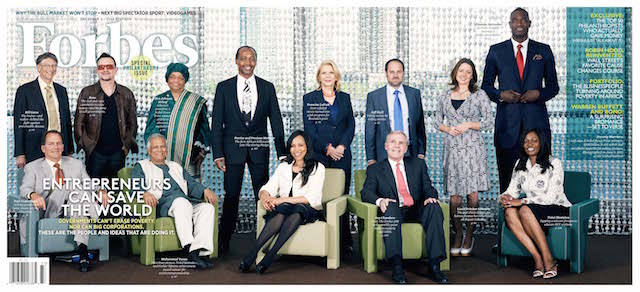UNITED NATIONS (IDN) – Global development policy is being increasingly influenced not only by “big business” but also by “big philanthropy”, warns a new study released here.
“They have become influential actors in international policy debates, including, most importantly, how to address poverty eradication, sustainable development, climate change and the protection of human rights”. SPANISH | GERMAN | HINDI | JAPANESE
“The scope of their influence in both past and present discourse and decision-making processes is fully equal to and in some cases goes beyond that of other private actors.”
The study titled Philanthropic Power and Development: Who Shapes the Agenda, published by the Berlin-based Global Policy Forum (GPF), has been authored by Jens Martens and Karolin Seitz.
Through the sheer size of their grant-making, personal networking and active advocacy, large global foundations, most notably the Rockefeller Foundation and the Bill & Melinda Gates Foundation, have played an increasingly active role in shaping the agenda-setting and funding priorities of international organizations and governments, according to the study.
“So far, there has been a fairly willing belief among governments and international organizations in the positive role of philanthropy in global development.”
Martens, co-author of the study and executive director of GPF, told IDN philanthropic foundations, particularly the Gates Foundation, the Rockefeller Foundation and the UN Foundation are not only major funders but also driving forces behind global multi-stakeholder partnerships.
Many of these partnerships, like the Children’s Vaccine Initiative, the TB Alliance, the GAVI Alliance, and Scaling up Nutrition (SUN), have been initiated by these foundations, he pointed out.
But the mushrooming of global partnerships and vertical funds, particularly in the health sector, has led to isolated and often poorly coordinated solutions.
These initiatives have not only contributed to the institutional weakening of the United Nations and its specialized agencies, but have also undermined the implementation of integrated development strategies at national level, he pointed out.
“We criticize in our study that there has been an often undifferentiated belief among governments and international organizations in the positive role of corporate philanthropy.”
In the outcome document of the Third International Conference on Financing for Development, namely the Addis Ababa Action Agenda, governments welcomed the rapid growth of philanthropic giving last July.
But, they also called for increased transparency and accountability and encouraged philanthropic donors to give due consideration to local circumstances and align with national policies and priorities.
“There is an urgent need for governments and the UN to assess the growing influence of major philanthropic foundations, especially the Bill & Melinda Gates Foundation, and to analyze the intended and unintended risks and side effects of their activities,” Martens declared.
In an article titled “The Billionaire Statesman” published December 9, the New York Times said Gates arrived at the Paris climate summit, which concluded December 12, with a message: governments should increase spending on research and development (R&D) of clean technologies.
Gates had invested about 1.0 billion dollars of his own money into start-ups working new kinds of batteries and nuclear reactors.
The Times quoted him as saying: “Honestly I’ve been a bit surprised that the climate talks historically haven’t had R&D on the agenda, in any way, shape or form.”
The GPF study recounts “a remarkable event” that took place in June 2013 in the UN Trusteeship Council where over 150 invited guests met for the second annual Forbes 400 Philanthropy Summit.
The event was opened by Secretary-General Ban Ki-Moon, attended by celebrated philanthropists, such as Bill Gates, Bono and Warren Buffett, and sponsored by Credit Suisse.
According to Forbes magazine the attendees, who represented “close to half a trillion of the world’s wealth, discussed how they can use their wealth, fame and entrepreneurial talent to eradicate poverty”.
As follow up to this summit, Forbes released a Special Philanthropy Issue under the headline “Entrepreneurs can save the world”.
The study said the event at UN Headquarters was a symbol for the rapidly growing role of philanthropists and their foundations in global development policy and practice.
Hailed for their ability to apply their business know-how and resources to solving the world’s global problems, ranging from poverty to climate change, they have been embraced by governments as a way to ease pressure on their own budgets and responsibilities.
This is particularly well documented in the areas of global health and disease eradication and nutrition, food and agriculture.
Two foundations in particular have long been active in both fields: the Rockefeller Foundation and more recently the Bill & Melinda Gates Foundation, both of which are the focus of this study.
The landscape
The study asks: Where do these foundations fit in the global foundation landscape?
Foundations differ in type, purpose, the way they are funded, their thematic focus, geographic scope, their priorities, approaches and political orientation.
Some work mainly at global level, others at regional, and still others at national or local level.
Among foundations with a global focus, their interests cover a wide range, from the science of climate change to global governance to eliminating poverty and hunger.
Their activities range from grant-making, to their own operational and advocacy activities and new forms of venture philanthropy, the study said.
“What they share however, is a firm conviction that the enormous global challenges facing the world today cannot be solved by governments alone, and indeed, can best be tackled by market-based, technological approaches, not unlike those many of their founders pioneered in the world of business.”
This approach, the study noted, has characterized the operations of the largest philanthropic foundations from the earliest days, particularly those that operate in the global arena. [IDN-InDepthNews – 14 December 2015]
This article is part of INPS/IDN media project jointly with Global Cooperation Council and Devnet Tokyo.
Please click here for the writer’s previous articles.
Photo: Second annual Forbes 400 Philanthropy Summit | Credit: UN.ORG
2015 IDN-InDepthNews | Analysis That Matters
Send your comment | Subscribe to IDN newsletter
Follow us on Twitter and Facebook:
http://twitter.com/InDepthNews
http://www.facebook.com/IDN.GoingDeeper

